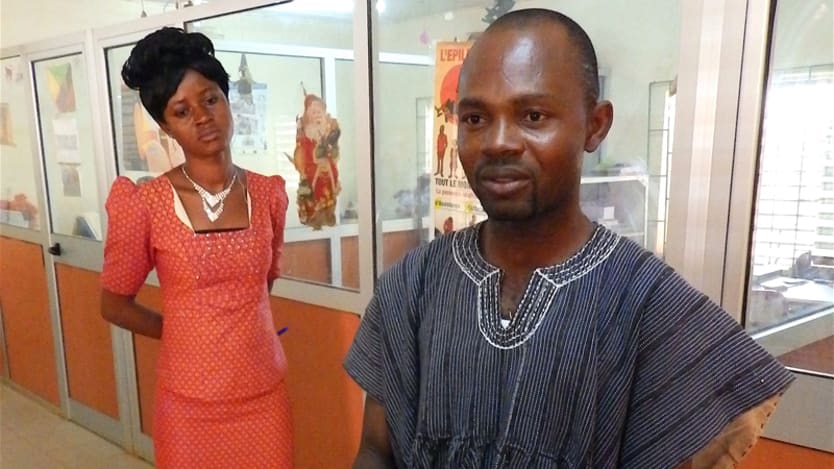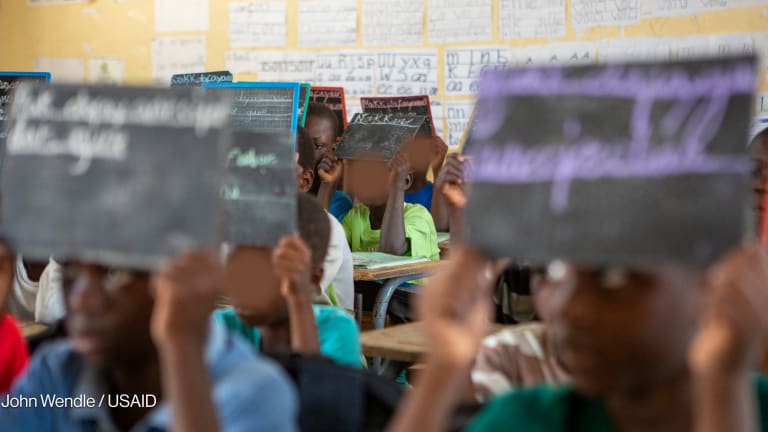
OUAGADOUGOU, Burkina Faso — Along the dusty streets of Ouagadougou, wheelchair-bound individuals strategically station themselves with plastic cups at stoplights to ask passersby for small change. For many of them, donations from others are their only source of income.
Not far away, one school is working to see that children with language difficulties don’t meet the same fate. The Center for Inclusive Education and Training of the Deaf and Hearing, or CEFISE, hosts mixed classrooms, bringing together students with hearing and learning disabilities along with those without, to create a supportive environment for handicapped students. Teachers educate students simultaneously using sign language and audible sounds. Across campus, specialized services including hearing tests, personalized education programs and speech therapy are offered to students, as well as the neighboring community.
With a stack of used flashcards on the corner of his wooden desk, Justin Dabire simulated a typical speech therapy session. Holding a card in front of him with a picture, he points to the illustration and says “ladder,” and says he would ask the student to repeat after him.
Dabire works as a certified speech pathologist at CEFISE, one of only three in this West African country of nearly 17 million residents. “We realized that many students here who have hearing disorders also have speech disorders, so we work [with] them to improve their language skills through word recognition, listening and repetition,” he said.
According to Light for the World, a disability and development charity, roughly 150 million children worldwide live with a disability, and 80 percent of them live in developing countries. There is no data on how many children in Burkina Faso have speech impediments linked to hearing deficiencies, but Dabire said the need is great. Some children are born deaf or hard of hearing, while adults can lose their language skills after a vascular accident, such as a stroke.
Dabire spoke to Devex about what it’s like to provide speech therapy in a developing country, and the struggle to help his government realize the importance of the work he does. Our conversation has been edited for length and clarity.
Why is the work that you do important, specifically here in West Africa?
It’s important because the problem of language and communication is growing. More and more children are born as victims of hearing impairments; they are numerous.
Sometimes after an accident, a vascular accident or a traffic accident, a person loses their language skills, and we start working with them, and the person eventually finds this ability to speak. It brings me joy to make this person happy again. Showing adults the results of their child who doesn’t speak, the day the child pronounces a word, the dad is happy, the mom is happy and equally the child who can now express themselves normally [is happy].
I still find it interesting, because we work with health workers who also don’t know much about this topic, who don’t have the patience and don’t know what to do.
There are just three speech therapists here in Burkina Faso. What would you say is the most difficult part of your work?
True, there are two here [at CEFISE] and there is only one somewhere else. There is a real need for more of us in the country, and the result is that all of us are overloaded with clients. Everyone has a calendar that is completely full.
The most difficult aspect of my work is that, for the moment, the state can’t help us more for people who cannot afford these services. We work as a private business, and from time to time, we offer public [free] services. But the state doesn’t understand yet the importance of this profession. Sometimes, the collaboration of the government-run health centers is not really effective. We have a need for their collaboration for certain things — for the medicine, for example, that we prescribe to certain patients. Or when we receive patients, if we have a need for certain medical exams, they are often unavailable.
Second, we have to recognize the financial aspect. The flashcards that we use, for example, cost us. To renew these products costs a bit much for us. We often ask parents for a small contribution when accepting patients, and parents find it expensive. And the treatments that we prescribe, parents often abandon prior to completion, due to questions around finances.
Normally when we receive a patient, we evaluate them before creating a weekly program. Based on the degree of severity of the person, we will determine if they need to come twice or three times per week. Each session is 3,000 West African CFA [about $5] and unfortunately there is no scholarship or financial aid from the state or NGOs for these services. Very few people find NGO support, by soliciting particular NGOs for help. What we’ve noticed is that when these families have this help, there is absolutely no problem for them to participate in classes, and it allows us to advance very quickly in our program. When the appointments are respected and kept, we have results. Unfortunately, there is nothing official for the moment.
You also mentioned that your work is difficult because often parents don’t have the patience. How does this desire for immediate results impact what you do?
Parents don’t have patience because they are more used to medical treatments or operations. When they arrive here, and think we will give them medicine, parents believe that they can take this to home, give it to their children, and then the language skills will come. Or they want us to operate on their tongues or on the brain. We propose other solutions. Parents try to follow [our instructions] but after a short while they don’t see concrete results, often coupled with a lack of extended observation. Sometimes, we have children who can’t even pronounce one word, but after our time together, achieve a small improvement. Parents want the children to call them “mama” or “papa” after a short time. The children don’t take medicine, they don’t receive surgery, and after three months, all they see is that they have spent money without quick results, so they quit the program. That’s our major problem.
What would you like to say to the Burkinabe government or to the international community about the recognition of speech therapy as a viable alternative to medical and surgical treatments for those with minimal language skills?
Our work is really troubled by the inability of parents to do more to help their children. Often, there is a financial burden that parents can’t handle, and it’s not their fault. We understand that in a poor country like Burkina Faso, there are other priorities aside from health care treatments. If there were some type of aid that could help parents to respect the program we set for them, we would see a drastic change.
Our appeal to the government, authorities and international community is that we have a need for human resources. We talk about three speech pathologists — that is so small for a single country like Burkina Faso, because we realize that the need is larger than we can handle. There is also no data that can support us in this effort, but I’m sure our handicap frequency matches that of international averages of people who are affected by hearing problems — around 10 percent. When we look at the fact that Burkina Faso is close to 17 million people, you can see how this is too much for us to handle. We have to emphasize how important speech pathologists are in developing countries, to treat those who have lost language skills due to strokes, other accidents, or difficult births. This language problem must be seen as important to local officials and the international community.
For more Devex coverage on global health, visit Focus On: Global Health






